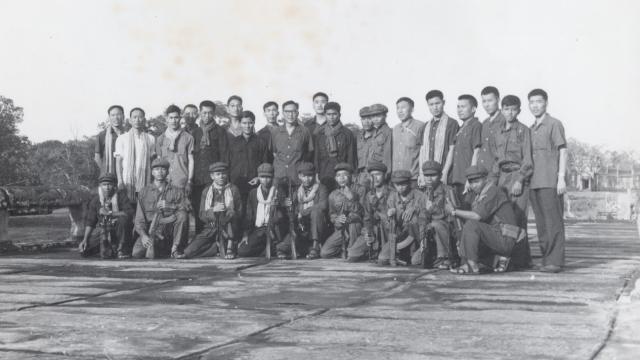
Photo of CCP officials with Khmer Rouge cadres in front of Angkor Wat. (Courtesy Documentation Center of Cambdoia, Phnom Penh).
There has been little scholarship on Chinese Communist Party (CCP) intelligence operations at home and abroad, and no extant study of the role that Chinese intelligence operations played in spreading Maoism globally. An important site where Maoism took root was Cambodia, where CCP intelligence and propaganda work sowed the seeds of Maoist enthusiasm and radical fanaticism beyond the Mainland. How did the Chinese Central Investigation Department (Diaochabu), headquartered in Phnom Penh in the People’s Republic of China Embassy, foment Maoist zeal among overseas Chinese communities and China enthusiasts in Cambodia?
This paper argues that the Diaochabu’s three-pronged strategy of local recruitment, community outreach, and cultural revolution-style agitprop via the popular Chinese-language newspaper, Sino-Khmer Daily (Mianhua ribao), spurred Maoist ardor first among ethnic Chinese, then among Cambodian intellectuals. Enthused by radical materials and Phnom Penh’s radical urban culture of the 1960s, overseas Chinese (H=Huaqiao) and Khmer progressive alike flocked to join the Ethnic Chinese Revolutionary Movement (Huayun) and Khmer Rouge, respectively. To trace this link, this paper highlights three hitherto overlooked primary sources that move us toward a fuller understanding of the phenomenon of global Maoism: memoirs of two Cambodia-based Diaochabu intelligence agents, Vita Chieu and Huang Shiming; and popular overseas Chinese newspapers, one of which operated as the Embassy’s official propaganda outlet. In drawing from these rich resources, this paper aims to fill long-standing gaps in the study of CCP intelligence work abroad, the method of global Maoism, and the modern history of Cambodia’s Chinese communities.
Matthew Galway is Senior Lecturer of Chinese History at the Australian National University. He is the author of The Emergence of Global Maoism: China’s Red Evangelism and the Cambodian Communist Movement, 1949-1979 (Cornell University Press, 2022) and first editor and contributor to Experiments with Marxism-Leninism in Cold War Southeast Asia (Australian National University Press, 2022). He has published his research in The Journal of Southeast Asian Studies, Modern Intellectual History, China Information, The Asia-Pacific Journal, Cross Currents, and Asian Ethnicity, among others, and is a frequent contributor to the Ear 2 Asia Podcast. He is Co-Editor-in-Chief of Q1 journal Asian Ethnicity and current Editor-in-Chief of East Asian History. His book project, entitled Agents of Maoism: Overseas Chinese, Communist Spies, and Radicalism in Cambodia's Global Sixties, is under contract with Cornell University Press.
Location
Speakers
- Matthew Galway
Event Series
Contact
- Ananyo Chakraborty